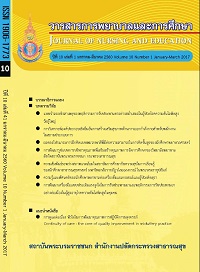ความรู้และทัศนคติของนักศึกษาพยาบาลต่อเครื่องดื่มแอลกอฮอล์และผู้ป่วยติดสุรา
คำสำคัญ:
Knowledge, Attitude Nursing Students, Alcohol, Alcohol Use Disordersบทคัดย่อ
บทคัดย่อ
การบริโภคเครื่องดื่มแอลกอฮอล์ถือเป็นปัญหาสาธารณสุขที่สำคัญของไทย การศึกษาเชิงสำรวจภาคตัดขวางนี้มีวัตถุประสงค์เพื่อ สำรวจความรู้และทัศนคติของนักศึกษาพยาบาลต่อเครื่องดื่มแอลกอฮอล์ และผู้ป่วยติดสุรา เปรียบเทียบระดับความรู้และทัศนคติต่อเครื่องดื่มแอลกอฮอล์ของนักศึกษาพยาบาลแต่ละชั้นปี และศึกษาปัจจัยที่มีความสัมพันธ์กับความรู้เรื่องเครื่องดื่มแอลกอฮอล์ของนักศึกษาพยาบาล กลุ่มตัวอย่างคือ นักศึกษาพยาบาลจำนวน 1,852 คน จากวิทยาลัยพยาบาล สังกัดสถาบันพระบรมราชชนก 10 แห่ง เครื่องมือที่ใช้เป็นแบบวัดความรู้เรื่องเครื่องดื่มแอลกอฮอล์ ปรับจากแบบวัดของ Baker & Stockton1 และแบบวัดทัศนคติของ Vargas2 สถิติที่ใช้ในการวิจัยคือ One-way ANOVA และ Multivariate logistic regression analysis
ผลการวิจัยพบว่า ในภาพรวมนักศึกษาส่วนใหญ่ (ร้อยละ 78.5) ไม่มีประสบการณ์การดูแลผู้ป่วยติดสุรา นักศึกษาพยาบาลชั้นปีที่ 1-4 มีความรู้เรื่องเครื่องดื่มแอลกอฮอล์น้อย คิดเป็นร้อยละ 78.0, 78.9, 70.3, และ 57.5 ตามลำดับ โดยนักศึกษาชั้นปีที่ 1 และ 2 ไม่มีความแตกต่างกัน แต่ชั้นปีที่ 3 และ 4 จะมีความรู้ดีขึ้นกว่าชั้นปีที่ต่ำกว่าอย่างมีนัยสำคัญทางสถิติ (p<.01) ปัจจัยที่มีความสัมพันธ์กับความรู้เรื่องเครื่องดื่มแอลกอฮอล์มี 3 ปัจจัย คือ ประสบการณ์การดูแลผู้ป่วยติดสุรา ประสบการณ์การดื่มเครื่องดื่มแอลกอฮอล์ และระดับชั้นปีของนักศึกษา ส่วนทัศนคติของนักศึกษาพยาบาลต่อเครื่องดื่มแอลกอฮอล์ และผู้ป่วยติดสุราอยู่ในระดับปานกลางและไม่มีความแตกต่างในแต่ละชั้นปี
ผลการศึกษาดังกล่าวสะท้อนให้เห็นว่า นักศึกษาพยาบาลยังมีความรู้เรื่องเครื่องดื่มแอลกอฮอล์น้อย และมีทัศนคติปานกลางต่อเครื่องดื่มแอลกอฮอล์ และผู้ป่วยติดสุรา จึงควรมีการพัฒนาความรู้และทัศนคติของนักศึกษาพยาบาลให้เป็นไปอย่างเหมาะสม เพื่อนำไปสู่ความสามารถในการดูแลผู้ที่มีปัญหาการบริโภคเครื่องดื่มแอลกอฮอล์
คำสำคัญ: ความรู้, ทัศนคติ, นักศึกษาพยาบาล, เครื่องดื่มแอลกอฮอล์, ผู้ป่วยติดสุรา
ABSTRACT
Alcohol consumption is a significant public health concern in Thailand. This cross-sectional study aimed at 1) exploring knowledge and attitudes toward alcohol and alcoholism among nursing students, 2) comparing knowledge and attitudes toward alcohol among different classes of students and 3) testing factors related to alcohol knowledge. Participants were 1,852 nursing students from 10 nursing colleges under the Praboromarajchanok Institute for Health Workforce Development. Tools used were modified from Baker & Stockton1 and Vargas.2 One-way ANOVA and Multivariate logistic regression analysis were used to analyze data.
Findings revealed that majority of nursing students (78.5%) did not have experience in caring for individuals with alcoholism. Alcohol knowledge among students in different classes 1-4 were at low level with 78.0%, 78.9%, 70.3%, and 57.5% respectively. There was a statistically significant difference of alcohol knowledge scores among the first, third and fourth year groups (p=<.001), but not between the first and second year student groups. Three factors were related to alcohol knowledge i.e. experience in caring for individuals with alcoholism, past personal drinking experience and class level. The students’ attitudes toward alcohol and alcoholism were at medium level. However, no difference in attitudes was found among students from different classes.
The results referred inadequate knowledge of nursing students on alcohol use while their attitudes were at medium level. Appropriate knowledge and attitudes toward alcohol related problems should be enhanced so that students’ competency and readiness in caring for such problems can be fulfilled.






